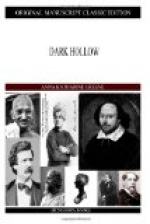Armed, then, in this unexpected way, but evidently not yet decided upon crime (or why his nervous whittling of the stick) he turned towards the bridge, following the meandering of the stream which in time led him across the bare spot where she had seen the shadow. That it was his shadow no one could doubt who knew all the circumstances, and that she should have leant just long enough from the ruins to mark this shadow and take it for her husband’s— and not long enough to see the man himself and so detect her error, was one of those anomalies of crime which make for judicial errors. John skurrying away through the thicket towards Claymore, Oliver threading his way down the ravine, and she hurrying away from the ruin above with her lost Reuther in hand! Such was the situation at this critical moment. Afterwards when she came back for the child’s bucket, some power had withheld her from looking again into the ravine or she might have been witness to the meeting at the bridge, and so been saved the misery and shame of believing as long as she did that the man who intercepted Algernon Etheridge at that place was her unhappy husband.
The knife with the broken point, which she had come upon in her search among the lad’s discarded effects, proved only too conclusively that it was his hand which had whittled the end of the bludgeon; for the bit of steel left in the wood and the bit lost from the knife were to her exact eye of the same size and an undoubted fit.
Oliver’s remorse, the judge’s discovery of his guilt (a discovery which may have been soon but probably was late—so late that the penalty of the doing had already been paid by the innocent), can only be guessed from the terrible sequel: a son dismissed, a desolated home in which the father lived as a recluse.
How the mystery cleared, as she looked at it! The house barred from guests—the double fence where, hidden from all eyes, the wretched father might walk his dreary round when night forbade him rest or memory became a whip of scorpions to lash him into fury or revolt—the stairs never passed—(how could he look upon rooms where his wife had dreamed the golden dreams of motherhood and the boy passed his days of innocent youth)—aye, and his own closed-up room guarded by Bela from intrusion as long as breath remained to animate his sinking body! What was its secret? Why, Oliver’s portrait! Had this been seen, marked as it was for all men’s reprobation, nothing could have stemmed inquiry; and inquiry was to be dreaded as Judge Ostrander’s own act had shown. Not till he had made his clumsy attempt to cover this memorial of love and guilt and rehanging it, thus hidden, where it would attract less attention, had she been admitted to his room. Alas! alas! that he had not destroyed it then and there. That, clinging to habits old as his grief and the remorse which had undoubtedly devoured him for the part he had played in this case of perverted justice, he had trusted to a sheet of paper to cover what nothing on earth could cover, once Justice were aroused or the wrath of God awakened.




